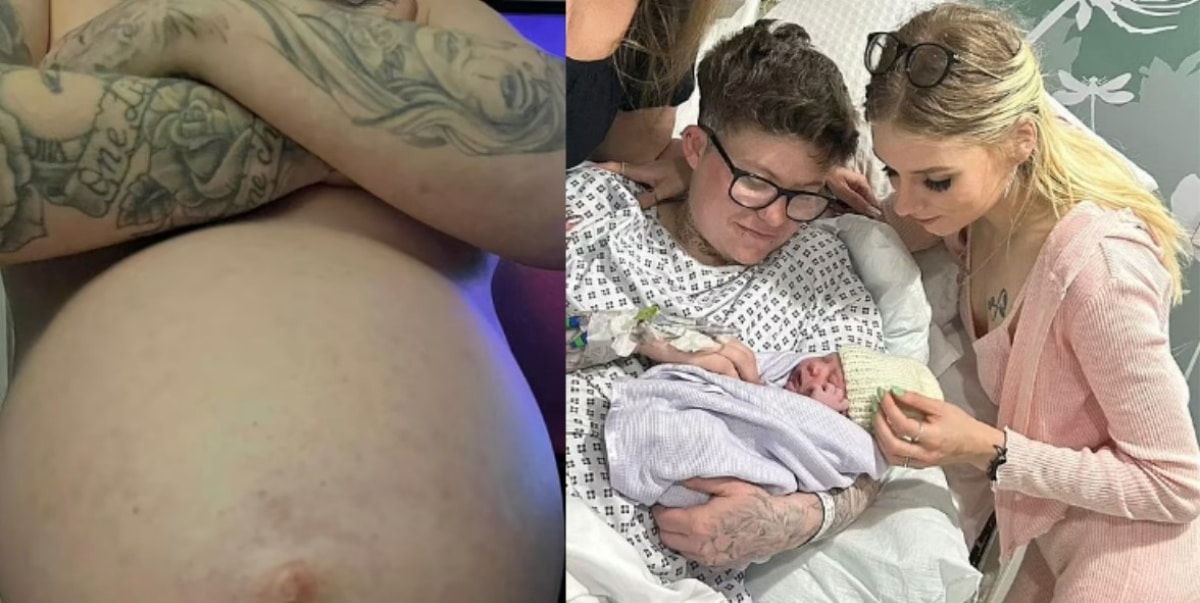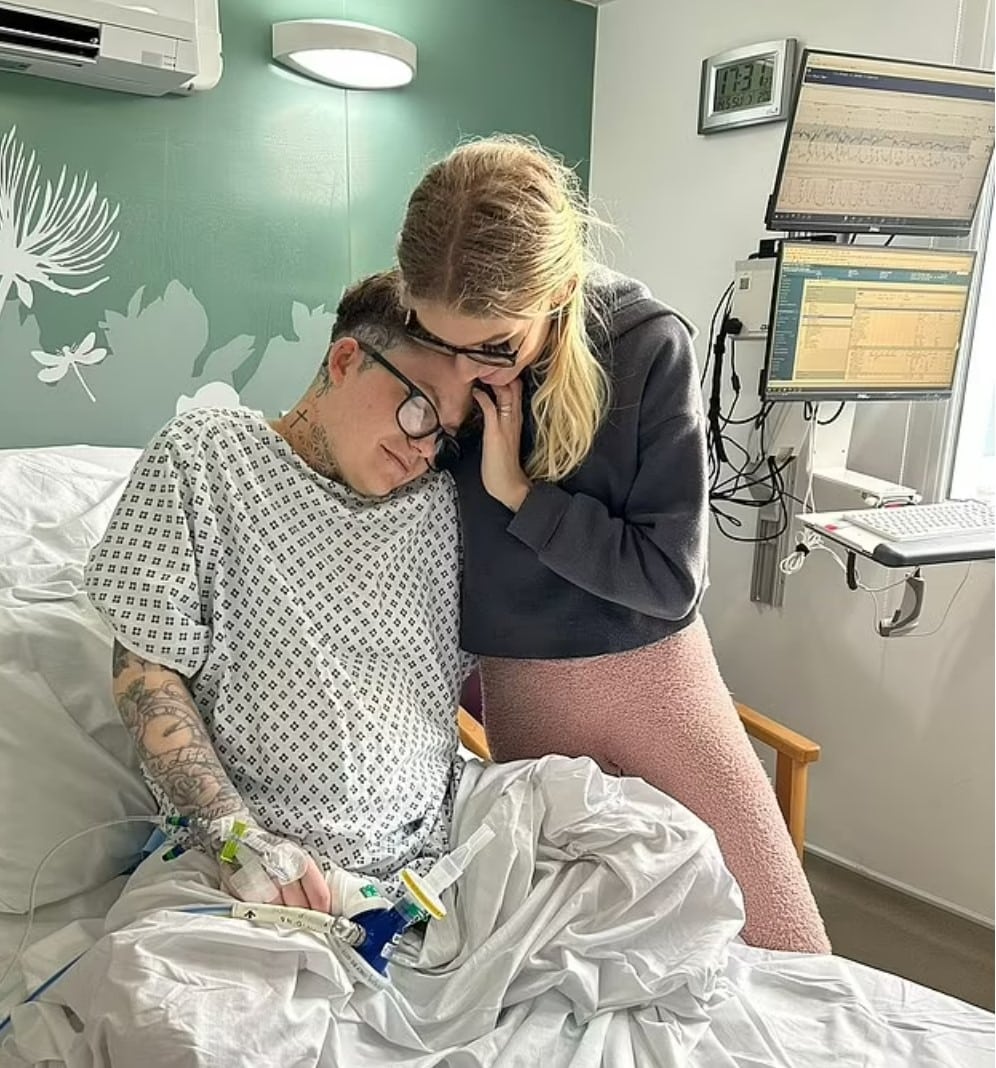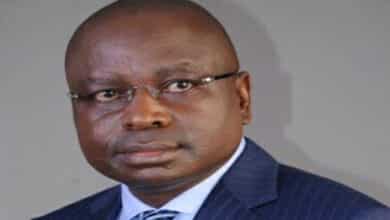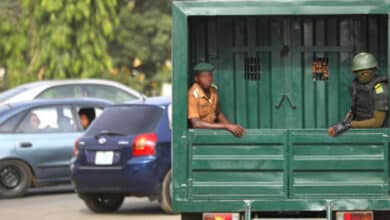How transgender dad had a baby after finding out his partner couldn’t have children

A transgender man stopped taking testosterone in order to have a baby after his partner discovered she was unable to have children.
Caleb Bolden, 27, a store manager from Chatteris, Cambridgeshire, started transitioning six years ago around the same time as him and his partner Niamh Bolden, 25 started trying to have a child via a sperm donor.

Niamh went on to experience three miscarriages and stillbirth of twins at 23 weeks and 27 weeks before being told she’d likely never have children naturally.
Rather than pay an estimated £70,000 for her to have private fertility treatment, the couple decided that Caleb would stop his daily testosterone injections and use a sperm donor in a bid to become pregnant himself.
Six months later he conceived using a sperm donor he found on social media, and Isla-Rae Bolden was born in May this year.
Despite enduring some cruel comments from strangers and suffering gender dysphoria during pregnancy, Caleb loves being a dad and plans to have another child.
“Coming off testosterone was a rocky road as I had so many hormones going around my body,” Caleb says of the decision to try for a child.
“Transitioning was something I knew I wanted to do from a young age, but for myself and my partner it [having a child] was something we had always wanted and I wanted to give it a shot.”
Caleb started transitioning in 2017, while his partner Niamh, also a store manager, found out she was unable to conceive naturally in 2022, after various miscarriages and a stillbirth in 2019.
Niamh says doctors told her the eggs she produces are immature, so are incapable of being fertilised.
National Institute for Health and Care Excellence guidelines say NHS-funded IVF is only available to women under 40 “who have not conceived after two years of regular unprotected intercourse or 12 cycles of artificial insemination (where six or more are by intrauterine insemination)”.
Campaigners have argued this guidance means women in same-sex relationships, or couples where one person is transgender, must “prove” they cannot conceive by undergoing artificial insemination.
The couple says this meant Niamh would be forced to undergo 12 consecutive rounds of artificial insemination – which could cost as much as £70,000, they claim – to receive NHS help.
So Caleb decided to try to conceive himself, and stopped taking testosterone in January 2022 – two years and three months after he began.
After meeting a sperm donor via social media and building a good relationship, Caleb went ahead with artificial insemination fertility treatment and discovered he was pregnant in August 2022.
“I’d been on testosterone for 27 months and was told there was a good chance I couldn’t fall pregnant, and my period probably wouldn’t come back,” he explains.
“But within a month of stopping my menstrual cycle returned and within six months and three attempts using a sperm donor, I fell pregnant.”
Despite receiving great support from the hospital and most friends and colleagues, Caleb describes receiving cruel comments from strangers about his pregnancy.
While his coworkers weren’t aware of him being trans until he revealed he was pregnant, they were supportive of his journey to parenthood.
Caleb says he received plenty of support from healthcare staff and was offered separate rooms for scans so women didn’t see him.
Midwives and a consultant also formulated a specialist care plan to make sure Caleb was able to maintain his privacy throughout, with Caleb also being induced and giving birth in a separate room rather than on a ward.
Describing his daughter’s arrival he says: “I suffered with complications and for the first four weeks after leaving hospital I was bed-bound so wasn’t able to have that bond with my daughter.
“During labour her heart rate was dropping rapidly and I underwent an episiotomy.
“But after leaving hospital I was in agony – it was because there was a breakdown in the episiotomy.
“The stitching broke down and I had constant infections for five weeks, I couldn’t move.”
Although Caleb did breastfeed for the first couple of weeks he describes finding it “difficult”.
“I know she’s my daughter and I gave birth to her but for me it felt really odd and I didn’t feel like that father figure to her,” he explains.
“I’ve recovered now so am able to do a lot more and my partner has been a great support.”
Caleb says his testosterone treatment is still on pause at the moment as he plans to try to conceive again later this year, using the same donor.
“I want to be able to carry a child one more time before I start taking testosterone again,” he says.
Caleb says he plans to talk to his daughter about “relevant” details of her conception at an “age appropriate” stage.
He also hopes that by sharing his story it will help others from the transgender community understand that parenthood is a possibility.
“I want other trans people to know it’s ok to carry a child,” he explains.
“We’re no different to any other person, just because we were born a biologically different sex. It doesn’t mean we should have to worry or lock ourselves away.”






